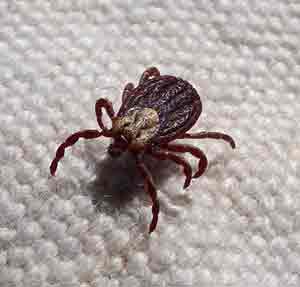I live in a fairly densely-wooded area north of Montreal, Canada. I’m surrounded by nothing but trees; my kids and dogs spend hours roaming the forest beside our house, and I wouldn’t have it any other way.
Unfortunately, there are some risks associated with roaming where the wild things are. Over the past few years, we’ve had to carefully remove ticks from our dogs. Last summer, my husband even found one on himself after working in the yard. We never sent the bug in for testing, but I’m starting to realize we should have, even though nothing serious came of it.
An Ohio woman recently made the news after being bitten by a tick; Jennifer Slone fought for her life for two weeks last summer. First, she experienced a high fever and vomiting; then came the meningitis diagnosis. She suffered liver damage, became septic, and needed three blood transfusions.

Two weeks of hell caused by a bacterial infection given to her by a tick. Slone thinks the bug bit into her body while she was gardening in her own yard.
That’s the crazy thing; many of us believe you can avoid ticks by staying out of the woods. In reality, the bugs will live on any kind of shrub or leafy plant. It means everyone is at risk.
The Centers for Disease Control and Prevention say illness caused by ticks and mosquitos are on the rise. From 2004 to 2016, the number of cases of disease caused by ticks grew from 22,500 to 48,600. And in Canada, experts are warning of a potential increase of Lyme disease cases this year. About 20% of all black-legged ticks carry the bacteria that causes the illness. Last year, there were nearly 1,500 people diagnosed with Lyme disease, a 50% jump from the year before.
Scientists say it’s only going to get worse, with tick habitats expected to spread like wildfire by the year 2080.
What To Look For
It’s important to know what you’re looking for when dealing with ticks. The bugs usually wait on the edge of leaves and jump onto hosts (that’s you) as they pass by. They attach themselves to your skin and suck on your blood.
Black-legged ticks, also known as deer ticks, aren’t the same variety that bites into dogs or other animals. The kind I’ve found on my dogs in the past are really quite easy to see. Unfortunately, the variety that like humans are much smaller and harder to find, somewhere between the size of a poppy and sesame seed.
How Can You Protect Yourself?
If you’re reading this blog, chances are you love nature and you don’t want to be afraid of it. You don’t have to be, but you should take some safety precautions in your garden to protect yourself from ticks:
- Wear long sleeves and tuck your shirt into your pants, and your pant legs into your socks
- Wear insect repellent that contains DEET
- Keep your lawn mowed and remove piles of brush from your yard
- If you live beside a wooded area, create a border between your property with gravel or wood chips. Ticks won’t cross that line!
- Always check yourself for ticks after being outside. Ask a buddy to double-check in case there’s anything you’ve missed.
If you do happen to find a tick on your body, remove it by following these instructions:
- With a clean pair of tweezers, grasp the tick by the head and pull it up and out. Do not twist or crush the bug.
- Sanitize the bite area with rubbing alcohol
- Put the tick inside a sealed container and mark down the date of the bite
Ticks can be killed by drowning them in rubbing alcohol or by freezing them for several hours. Once they’re dead, they can be thrown into the garbage. But rather than doing these things, it’s recommended you send the tick in for testing. Most of us don’t do this because we think tick-borne diseases won’t happen to us; always somebody else. I know that’s why I’ve never done it. But this is too serious to ignore, and Jennifer Slone’s story serves as a wake-up call to us all.
If you live in the USA, TickReport will test any tick you send in for the bacteria that causes Lyme disease and other illnesses. In Canada, almost all the provinces have individual departments that will perform the testing process for you. Finding out if the tick that bit you is infected ensures that you get early treatment before these diseases cause lifelong problems.
I never worried about ticks when I was a kid. But times have changed, and I have to be concerned now for my own children. As I watch them run through the forest without a care in the world, I know I’ve got to protect them and myself from the things lurking on the leaves.